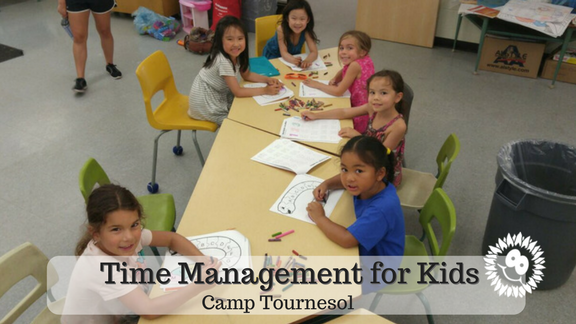 With more and more distractions coming from all types of devices and social media platforms, it’s no surprise that kids struggle with organizing their time. These days, it’s important to teach children time management skills as early as possible to help them succeed in school and after-school activities. Especially for kids in special programs such as French Immersion, school can become very challenging very fast. However, with the right tools and skills, there’s plenty of time for your children to work hard at their goals and – most importantly – still have time to be a kid!
With that said, here are our top tips for time management:
With more and more distractions coming from all types of devices and social media platforms, it’s no surprise that kids struggle with organizing their time. These days, it’s important to teach children time management skills as early as possible to help them succeed in school and after-school activities. Especially for kids in special programs such as French Immersion, school can become very challenging very fast. However, with the right tools and skills, there’s plenty of time for your children to work hard at their goals and – most importantly – still have time to be a kid!
With that said, here are our top tips for time management:
Get a good night’s sleep
Before even thinking about organizing our time, we need to make sure we’re well rested! The first step to making sure your child will be healthy, happy and able to excel is for them to sleep well. Getting 8 or 9 hours of sleep a night is crucial, but how do we make that easier?- Set a bedtime
- Setting a bedtime will get your child accustomed to a good sleep schedule. Not only that, but it will help them learn about planning ahead. They’ll know that if they should be in bed by 9:30, they should set aside 15 minutes to brush their teeth and get into their PJs. An even better idea is creating a bedtime routine with them – it will give them a chance to experience actively creating a schedule with their best interests in mind.
- Turn off electronics
- It’s well known by now that the harsh light from the screens of our devices interrupts our ability to fall asleep. It’s also well know that it’s near impossible to get kids away from those devices. Creating a household rule to leave all phones and tablets in a common room before going to bed can be a way to prevent screen-time before bed-time. Similarly, it can be helpful to set a certain amount of time before bed that should be completely screen-free. Making sure your child uses a tangible alarm clock instead of the alarm on their phones or iPods does away with that excuse. Lastly, encouraging reading or journaling before bed will replace a bad habit with a good one and will help them fall asleep faster.

Daily routine
Once you’ve gotten the sleep schedule in place, why not practice making a daytime schedule too? Similar to the night routine, a daily routine can help your child learn how to plan effectively and make a list of the things they need to and want to get done on a daily basis. This can be especially helpful for school days, where they can even make a list of things to do before heading off to school (ie, wash face, eat breakfast, pack homework, etc). Allotting a specific block of time for homework every day can give your child a clear image of when they should be getting their work done on a daily basis, and how long they should work before taking a break.Use a planner
Next, use a planner or an agenda (most schools give one to each student) with them to instill a habit of writing down important tasks. By checking their agenda at the beginning or end of every day, you encourage them to make to-do lists, write in important events (such as school field trips or after-school activities), and check them off when done. This is a crucial skill that they will take with them into teenage years and adulthood, so it’s a great idea to start now! Eventually, they will learn what system works best for them. Do they prefer an online calendar (like Google calendars)? Maybe they like planning day-by-day instead of week-by-week? Determining their ideal way to organize their time early on will benefit them in the future – some people don’t have the opportunity to figure this out until well into college! Bonus tip: get them excited about using their agenda with colourful pens, markers, and stickers to make it their own!
Family calendar
Individual planners are fantastic, but learning to manage your time with other people is just as important. By making your family’s calendar a focal point (perhaps by placing it on the fridge) encourages your child to consider not just their schedule, but other people’s schedules as well. Invite them to take initiative by writing their own important events on the calendar – they’ll feel encouraged by taking responsibility.Schedule free time
Equally important to scheduling special events and homework due dates is scheduling free time. At the end of the day kids have to be kids, but especially for the older ones, school and extracurriculars can begin to overwhelm their lives. They can get lost in all their obligations and forget to relax. Allow your child to schedule play time, time to hang out with their friends, or days where they can just do nothing at all. This will help them get a good sense of balance and make sure they understand the significance of time spent with friends, family, or themselves. Bonus tip: let your child know that it’s okay to ask for extra time on a school assignment or to miss a sports practice on occasion when they’re feeling overwhelmed. Learning to put their well-being first is a essential skill.
Create a study space
When it’s time to buckle down and get some homework done, a clean and comfortable study space is key for kids. If they have their own desk, remind them to keep it clean and prompt them to decorate it to their liking. Creating a space that is cozy for them will make them want to spend time there, and make the homework process go that much more smoothly. If they prefer working in a common area like the kitchen table, talk to them about when the best time would be. For example, it might be too hectic in the kitchen right before dinnertime, so they can set aside homework time for right after school instead.Refine activities
When children have an opportunity to attempt and improve different types of skills, it’s undoubtedly enriching. Sports, music lessons, science clubs; there’s a long list of possible in-school or after-school activities for your child to engage in. Encouraging them to join whatever they can is a great approach, but asking them to reflect on what they participate in can also be helpful. For instance, if they’ve been taking piano lessons for several years but their interest seems to be dwindling, it may be best to sit down and talk with them about it. Ask them if this is something they have fun doing or if it’s simply a cause of stress and frustration. This instills a practice of self-awareness, and can help determine if they’re participating in too much at once. Allowing them to review their commitments will make sure that their extracurriculars are a positive and worthwhile way to spend their time, rather than a chore.
